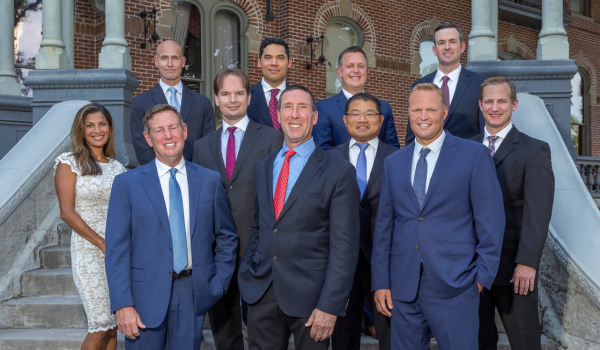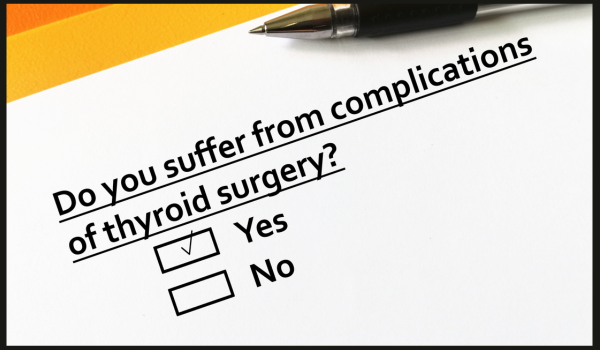Minimizing Complications of Thyroidectomy

Thyroidectomy is the surgical removal of the thyroid gland. This is a common surgery for various thyroid conditions, including cancer, goiters, nodules, Grave’s disease, Hashimoto’s disease and others. While this surgery can cure thyroid cancer and thyroid disease while significantly improving a patient's quality of life, it has inherent risks like all other surgery and medical interventions.
Minimizing Complications of Thyroidectomy
Choosing an experienced thyroid surgeon can dramatically reduce the likelihood of complications. In fact, choosing a thyroid surgeon is the most important decision you’ll make throughout the process of your thyroidectomy. Like almost every other skill, craft, trade, etc., thyroid surgery does not become exceptional until a surgeon has performed thousands of operations. (insert blog link)
Potential Complications of Thyroidectomy
Thyroidectomy is very safe when performed by an experienced surgeon. At our center, the risk of complication is less than 1%. Like any surgery, however, there are potential complications of thyroidectomy—especially in inexperienced hands. Here are some of the possible complications of thyroidectomy:
- Infection: Surgical site infections can occur in any surgical procedure, including thyroidectomy. With proper sterile technique, skilled and efficient surgery, and excellent post-operative care and patient instruction, the risk of infection after a thyroidectomy is minimal.
- Bleeding: Excessive bleeding during or after thyroid surgery is a potential complication of thyroidectomy. Experienced and expert thyroid surgery minimizes the risk of bleeding. Only by performing numerous thyroidectomies can a surgeon gain an in- depth knowledge of the anatomy and the surgery itself along with common and uncommon variations and challenges that may arise with both. This significantly reduces the risk of bleeding during and after a thyroidectomy.
- Nerve Damage: The thyroid gland is situated near the recurrent laryngeal nerves and their branches, which control vocal cord movement. Inexperienced surgeons may inadvertently damage this nerve, leading to temporary or even permanent voice changes, difficulty swallowing, or worst case, difficulty breathing if both nerves are damaged at the same time. At the Clayman Thyroid Center, the foundation of our surgery process is to identify and save the nerves to the voice box. We safely identify these nerves 100% of the time before during any thyroid operation. Only highly skilled and experienced thyroid surgeons will be able to safely perform a thyroidectomy while preserving the nerve(s) to the voice box. Learn more here: https://www.thyroidcancer.com/blog/top-3-things-to-know-about-the-nerve-to-the-voicebox

- Hypoparathyroidism: This condition can occur if the parathyroid glands, which regulate calcium levels in the body, are accidentally damaged or removed during thyroidectomy leaving a patient with not enough functional parathyroid tissue permanently. This is a very challenging and inconvenient complication of thyroidectomy to deal with as the patient needs multiple supplements and different doses of each to maintain normal calcium levels.
Each person almost always has four parathyroid glands located on or near the thyroid gland. There are two on each side of the neck. During a thyroidectomy, it is imperative to identify and preserve all the parathyroid glands involved (either two or all 4 depending on the type of thyroidectomy). Even though a person can have normally calcium regulation with only one parathyroid gland or part of a healthy parathyroid gland, the surgeons at the Clayman Thyroid Center treat every parathyroid gland as if it is the only one left. Skilled thyroid surgeons make every effort to preserve these glands and avoid permanent hypoparathyroidism.
Did you know? The Norman Parathyroid Center, the world’s most experienced and highest volume parathyroid surgeons, operate alongside the Clayman Thyroid Center at the Hospital for Endocrine Surgery. Learn more here: https://www.parathyroid.com/.png)
- Unsightly Scar Formation: A visible and unsightly scar is often a concern for patients undergoing thyroidectomy. Although the appearance of scars varies from person to person and surgery performed, experienced and skilled thyroid surgeons employ techniques to minimize scarring and promote optimal healing. A plastic surgery closure of the incision is crucial to ensure a scar that is not visible once completely healed.
Watch Dr. Roy explain her incision techniques to hide your scar beautifully: https://youtu.be/dbRXiazGMbc
Did you know? The Clayman Thyroid Center also offers scarless robotic thyroid surgeon to those who are good candidates for the procedure. Learn more here: https://www.thyroidcancer.com/scarless-thyroid-surgery
Choosing an Experienced Thyroid Surgeon:
The key to minimizing the complications of thyroidectomy lies in selecting an experienced thyroid surgeon and a reputable thyroid surgery center. The Clayman Thyroid Center stands out as a premier institution with a long history of excellence in thyroid surgery.
Here's how choosing an experienced surgeon from our center can greatly reduce the risk of complications of thyroidectomy:
- Expertise: Our surgeons have extensive training and experience in thyroid surgery, having performed thousands of thyroid procedures every year. In fact, they perform thyroid surgery exclusively and are 100% dedicated to the surgical treatment of thyroid disease. This expertise translates into a much higher level of skill and precision during surgery while almost eliminating complications of thyroidectomy.
- Advanced Techniques: The Clayman Thyroid Center stays at the forefront of surgical techniques and technology utilized in thyroid surgery. Our surgeons employ the latest advancements to enhance surgical outcomes and minimize complications of thyroidectomy.
- Comprehensive Evaluation: Before recommending thyroid surgery, our team conducts a thorough evaluation, including diagnostic testing and consultations, to ensure that surgery is the most appropriate option for the patient's specific condition. It starts with our thyroid ultrasound, using the most state-of-the-art equipment and experienced thyroid ultrasound technicians in the country. Learn more here: https://www.thyroidcancer.com/blog/thyroid-ultrasound-4-things-you-need-to-know
Watch Dr. Roy detail a day in the life of a patient at the Clayman Thyroid Center, including the comprehensive thyroid evaluation: https://youtu.be/blHBBnlLI9o - Preservation of Parathyroid Glands: We prioritize the preservation of all parathyroid glands to reduce the risk of hypoparathyroidism and its associated complications. Learn more here: https://www.thyroidcancer.com/thyroid-cancer-surgery/thyroid-parathyroid
- Vocal Cord Monitoring: During surgery, we use advanced techniques like intraoperative nerve monitoring to check the functional integrity of the recurrent laryngeal nerve during and at the end of a thyroidectomy . Nerve monitoring in and of itself does not save the nerves to the voice box. Only highly skilled and experienced thyroid surgeons are able to safely perform a thyroidectomy while preserving the nerves that control the vocal cords. It is very important for you to find an expert thyroid surgeon to make sure your nerves to the voice box are preserved to ensure there are no changes in voice, swallowing, or breathing after a thyroid surgery.
- Post-Operative Care: Our commitment to patient care extends beyond the operating room. We provide comprehensive post-operative care and support to optimize healing and minimize complications during the recovery process. All of our patients have the direct numbers and emails for our nurses, mid-level providers, and surgeons.
Case Study: A Success Story
Meet Sarah, a 38-year-old patient who recently underwent thyroidectomy at the Clayman Thyroid Center. Sarah was diagnosed with thyroid cancer and was understandably anxious about the surgery. She chose to travel from the United Kingdom to have surgery at our center because of the level of comfort and peace of mind she felt with our team.
Sarah's surgery was performed by Dr. Roy and Dr. Walsh. Every thyroid operation has two expert surgeons present, which is a huge bonus for the patients. The surgeons removed the cancerous thyroid tissue while preserving the parathyroid glands and recurrent laryngeal nerve. They also identified and removed cancerous lymph nodes behind and around the thyroid lobe using our state-of-the-art bedside pathology. They removed all traces of cancer, while preserving half of her thyroid gland so that she will not be dependent of thyroid medication for the rest of her life. Sarah experienced minimal discomfort post-surgery while her incision healed perfectly and her voice remained unchanged.
Hear the patient tell her story: https://www.youtube.com/watch?v=b_WIEN9Mxug
Conclusion:
Thyroidectomy is a valuable and often life-saving procedure for patients with various thyroid conditions. As with any surgery, there are potential complications of a thyroidectomy. Choosing an experienced thyroid surgeon from a trusted center of excellence like the Clayman Thyroid Center can significantly minimizes these risks.
Our commitment to excellence, advanced surgical techniques, and comprehensive patient care ensure that you receive the highest level of expertise and support throughout your thyroidectomy journey. Don't leave your thyroid health to chance—choose the Clayman Thyroid Center for a safer and more successful thyroidectomy experience. To learn more and become a patient, please visit:
Additional Resources
- Become our patient by filling out the form at this link.
- Learn more about The Clayman Thyroid Center here.
- Learn more about our sister surgeons at the Scarless Thyroid Surgery Center, Norman Parathyroid Center, and Carling Adrenal Center
- Learn more about the Hospital for Endocrine Surgery.
.png)